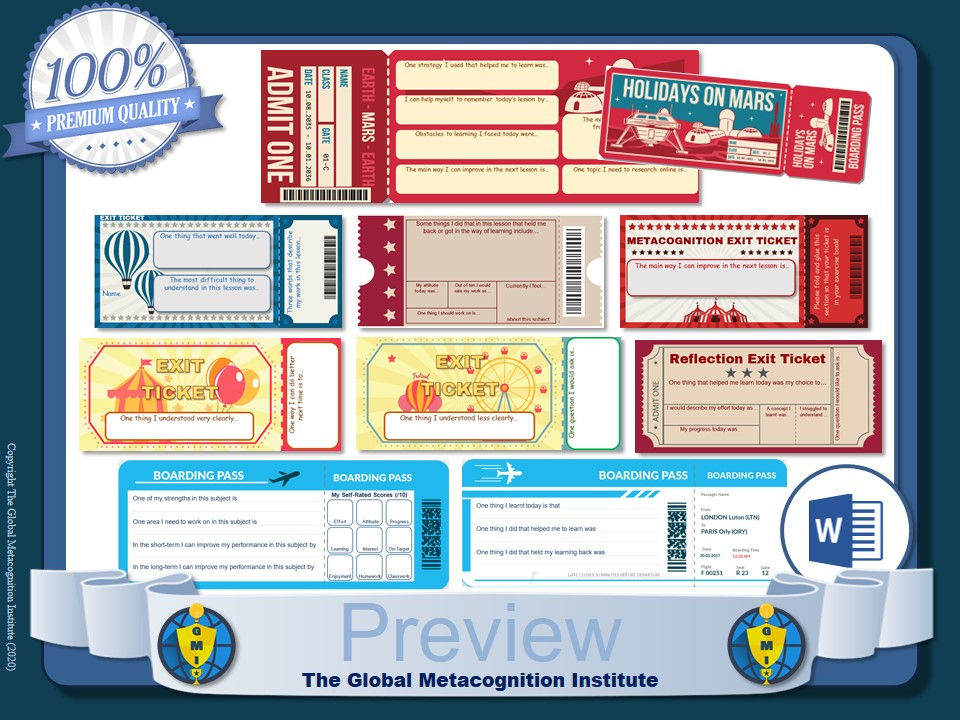What does good practice look like when it comes to metacognition in the classroom? What are the features of a comprehensive metacognition strategy for teachers in secondary education?
We've condensed the central practices of metacognitive teaching into this simple twenty-point list: if you are a teacher, simply run through the list indicating whether each statement is true or false. By doing so you can evaluate your teaching practice and identify some simple ways to improve.
Remember that metacognition, in it's simplest terms, is 'thinking deeply about how one learns best'.
I allow for Dedicated Reflection & Improvement Time (DIRT) on a regular basis »
I use a Personal Learning Checklists so that students can monitor subject-knowledge progress
My students are given time to reflect on and set their own targets for improvement »
I frequently use questions/questioning to trigger metacognitive awareness & metacognition in my students »
I model the use of metacognitive strategies in front of my students in most lessons
I use exam-wrappers (A.K.A. 'Cognitive Wrappers' or 'Assessment Wrappers') to foster pre-assessment & post-assessment reflections when doing practice papers or significant assessments »
I use metacognition reflection worksheets with my classes »
I explicitly teach my students about metacognition - most of them would be able to give a basic definition of what metacognition is and explain why it is useful »
I encourage mindfulness and meditation in my lessons in order to train students to monitor their mental states and learning processes »
Students in my lessons are regularly encouraged to engage in debates and discussions about how they learn best and how, in general, to maximise learning-power »
My classroom features posters and displays that are designed to encourage metacognition and to boost learning-power »
I encourage my students to reflect on how their emotions & moods are impacting their learning »
I encourage my students to reflect upon how their lifestyle choices are impacting their learning (for example: diet, exercise, sleep, hydration) in a sensitive and helpful manner »
In my lessons students are taught about (and utilise) memory devices such as mnemonics and mind-palaces »
My approach to teaching places a heavy emphasis on transferable study-skills and teaches students how to develop new study skills that can build learning-power (e.g. research skills, organisational skills, or mind-mapping skills) »
I encourage my students to reflect on which learning and revision activities actually help them learn and are given a degree of choice about which learning-activities they engage in »
I encourage deep, critical and philosophical thinking in my students with reference to epistemological issues such as the nature of knowledge, how knowledge is best acquired, and the difference between knowledge and mere belief »
I use an objective measure (such as The Metacognitive Awareness Inventory) or data from such a tool to inform my practice: identifying students in need and using interventions to improve their levels of metacognition »
I have systems in place to ensure that metacognitive strategies are applied in an organised and regular fashion
I view my students through a 'Growth Mindset' lens. Where possible my students are taught various ways that they can increase their intelligence, memory and concentration over time. Likewise, they know what factors can weaken these metacognitive powers over time. »
Where you see a '»' symbol you can click it to be taken to a free or premium resource that can help with that issue.
If you want to improve your teaching practices in relation to metacognition check out our free sample resources, browse our individual downloads or save money with our bundles. You can also gain complete access to our Member's Area which contains our entire range of metacognition & learning-power resources by registering for a full-membership plan.
















































Комментарии